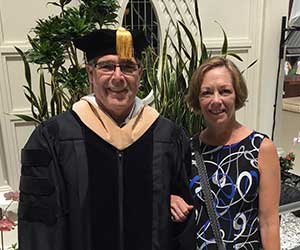
Imagine waiting for approval to purchase a pair of boots for the same amount of time as it takes to receive approval to build a jet. Though seemingly impractical, it’s what Dr. Donald Schlomer, Doctor of Business Administration (DBA) graduate and 2018 recipient of the Frank Dilley Award for Outstanding Doctoral Study, discovered was happening within the U.S. military.
“I was working for the U.S. Army at Fort Benning, Georgia, after teaching the Joint Capabilities Integration and Development System (JCIDS), a process that the Department of Defense (DOD) acquisition personnel use to identify, assess, and prioritize the development of a military need. While there, I realized something was not right about waiting 337 days for approval on programs such as boots, uniforms, radios, computers, and sensors,” says Dr. Schlomer, who was an instructor at the U.S. Army Command and General Staff College. “Even though leadership agreed the procurement process needed to be fixed, I knew if I was going to help solve this problem, it would have to be in concert with a doctoral program so the findings and my perspective would get the attention they deserved.”
According to Dr. Schlomer, there are slightly less than 80 acquisition programs in the military, called Major Defense Acquisition Programs, that are at the jet or tank level and require more than $2.79 billion in procurement; however, there are thousands of acquisition programs like boots, uniforms, and backpacks requiring less than $834 million. “Technology advances every 14–18 months, or 540 days; however, the current JCIDS process takes 72–90 months to deliver a new program to a warfighter. This effectively leaves our military personnel all over the world inadequately equipped,” he says.
The JCIDS process began in 2003 and had been used throughout all branches of the U.S. military for 11 years before Dr. Schlomer started his journey at Walden. With more than 30 years of experience within the DOD as an Army officer, including 13 years of direct knowledge of JCIDS and the DOD acquisition system, Dr. Schlomer was uniquely qualified to perform this doctoral study. “I knew all of the players, understood and could speak the language of acquisition, and had the necessary clearance to speak with those close to the JCIDS process. It was absolutely a perfect storm.”
Dr. Schlomer’s dissertation, Strategies for Exploring: ACAT III Requirement Approval Process, reveals idiosyncrasies in the Army’s JCIDS process that causes delays. For example, the Chief of Staff of the Army reviews all proposals regardless of procurement amount. Additionally, the staff of the Centers of Excellence in charge of creating procurement proposals use crowdsourcing and push out to worldwide staffing for their input before proceeding through the approval pipeline.
As a result of his award-winning dissertation, the military specifically asked Dr. Schlomer to be a member of the new Army Futures Command Task Force to address issues of Army procurement. “I have been asked to be part of this task force as a subject matter expert because of my research and published articles. I am the only non-military or non-government representative. It’s overwhelming to know they acknowledge my work and asked for me personally to be involved,” says Dr. Schlomer. “It has been an incredibly humbling experience to see my research being applied.”
Dr. Schlomer says the goal is to have a new Army Futures Command in place by 2020, which will affect all acquisition programs and Army future modernization. “It’s incredible to realize that my work will affect every single taxpayer in the United States, redirecting money toward other important military efforts and allowing U.S. citizens to be safer around the world.”
“I could not have done this without the help of Walden and its military support team,” shares Dr. Schlomer. “I also hope my journey at Walden helps pave the way for future members of the military to address problems in society with their doctoral degree.”
—Jen Raider



